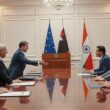Germany secured top spot in UEFA’s European Qualifiers Group A on Friday evening, edging past Luxembourg 2-0 in a match that exposed vulnerabilities within the national team despite a seemingly straightforward victory. The result, achieved through two goals from substitute Nick Woltemade in the 49th and 69th minutes, belies a surprisingly challenging performance against a determined and tactically astute Luxembourg side.
The Stade de Luxembourg witnessed a stark reality check for the heavily favored German team. Luxembourg, exhibiting a courage and organization that repeatedly disrupted Germany’s rhythm, presented early and persistent problems. Counter-attacks from the hosts exposed weaknesses in Germany’s defensive structure, even creating slightly more clear-cut chances than the DFB-Elf before halftime. The opening period offered a disconcerting lack of dominance, prompting questions about the team’s adaptability and tactical preparedness.
While Woltemade’s well-worked goal shortly after the restart provided initial relief, Luxembourg promptly responded with two significant opportunities to equalize, highlighting Germany’s fragility at the back. Manager Julian Nagelsmann’s early substitution of Leon Goretzka, facing potential suspension via a second yellow card, reflected the mounting pressure and a need to manage the precarious state of the game. The second goal, while ultimately decisive, felt more fortuitous than a consequence of sustained German pressure.
The subsequent lull in Luxembourg’s intensity allowed Germany to comfortably manage the match, a display of controlled, albeit uninspired, gameplay. Concerns linger, however, regarding Germany’s ability to consistently impose themselves on opposition. The performance raises questions about the team’s dependence on individual brilliance and the lack of a cohesive strategic identity, especially when facing organized resistance. The victory, while technically secured, did little to alleviate anxieties surrounding the team’s long-term prospects and the ongoing search for a sustainable, dominant playing style ahead of major tournaments. The relative ease with which Luxembourg dictated play for periods of the game will undoubtedly be subject to critical analysis within the German camp.





